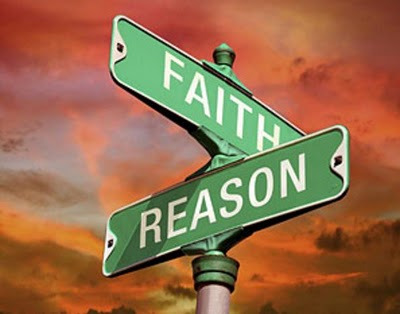Relying on Reason is not a Faith Position
What I want to analyse here is a clip from a debate between the late Christopher Hitchens and Pastor Douglas Wilson. Wilson’s claim is that both atheists and theists equally hold a faith position – atheists have faith in reason, theists in their respective holy books.
“I have faith in the Bible, you have faith in reason”
Wilson tries to argue that both atheists and theists operate in the same way intellectually. When a theist makes a claim about the world, their starting point, or “axiom”, is their Holy Book. For an atheist, their equivalent starting point is reason itself.
As Wilson goes on to say, there’s no way one can justify the reasoning process and so trusting in the reasoning process is an act of faith. The atheist must have faith in reason and so is a person of faith in the same way that a theist is.
When a theist tries to justify their faith by pointing to sections of their holy books they are charged with the objection that they’re appealing to what they need to prove, and of circularity. Wilson claims that atheists are hypocritical in applying this charge. Atheists can’t appeal to anything other than reason in order to justify the reasoning process, and so should be vulnerable to the same charge of circularity.
If this argument were valid, it would show that theistic positions are no worse than atheistic ones. I hope however you already have some idea of why this argument falls flat.
Atheism does not make as many leaps of faith as theism (if any at all)
The simplest rebuttal is to say that theistic positions are worse than atheistic ones because they have to make at least double the number of leaps of faith as atheistic ones. If we play ball for a minute here and accept the charge that trusting in reason is a leap of faith, then fine, but the theist has to make this leap too.
Holy books say nothing about the laws of reasoning, yet it is surely true that no human can survive without them. We use reason all the time whatever we’re doing. The theist has to make two leaps of faith, they have to make one for their holy book, but also one for reason.
Perhaps the atheist can be charged with having faith in some sense, but theists, by definition, have to take at least one extra leap of faith than atheists.
Is trusting the reasoning process and act of faith?
The contention that atheists have to have faith in reason is a much more difficult one to rebuke. There is no way we have of justifying the reasoning process without using the reasoning process itself. We can’t even say that the reasoning process is justified because whenever we’ve used it it has worked. This is an inductive argument and as I have touched upon here: Induction: The Rocky Foundations of Science it is very unclear whether inductive arguments can really be justified.
But in order to justify something, we automatically have to assume the laws of logic and reasoning. To justify something is to provide a deductive argument with the conclusion being what you’re trying to justify. But this means if we’re charged with justifying our trust in reason we can assume the laws of deduction, and hence reason, and the proof is trivial.
This may seem altogether unsatisfying and perhaps even circular but it reflects a fundamental truth. To say I have to justify reason without assuming the laws of logic just doesn’t make any sense. Without reasoning, we have nothing, literally nothing. It makes no sense to try and justify reasoning without using reasoning because as Hitchens says “Logic is the attempt by humans to make sense”. Without logic, we can’t speak sense and so can’t even formulate the question “how do you justify logic”, because the word justify would be undefined.
Epistemology Naturalised
A much more effective question, or at least a question that makes sense, that a theist can ask is to ask an atheist to provide an argument for why reasoning works. The atheist can however provide the beginnings of an explanation and hence and answer to this question. Of course we don’t yet know for certain why it is that we can comprehend the universe, it’s one of life’s great mysteries, but we can make some preliminary suggestions.
We’re fairly sure that the universe itself is logical in its structure. The things within it obey precise mathematical laws which are essentially statements of logic. We can then appeal to evolution by natural selection. It seems plausible to suggest that creatures whose brains can comprehend the underlying logic of the universe are going to be much better at surviving than creatures that can’t. Survival is all about using the world around you in order to prolong one’s existence, a creature that can understand the world around it would, I imagine, fare much better than one that can’t. So it’s not surprising then that we’re able to comprehend the logic of the universe at least to some extent.


I will attempt to abstain from the discussion regarding the existence of God. However I did want to point out the inherent flaw in your argument.
You argument assumes that those that believe in God also believe in the validity of logic and reasoning. If they do not make this assumption, then both sides of the argument are making exactly the same number of assumptions, one. Furthermore, if the validity of logic itself is not assumed, then your logical reasoned argument holds no merit because it is based on logic.
In this way, this article is much like arguing with your own emotions. They do not follow logic or reason. They are not even chaotic, because that supposes a deterministic system, but are rather nearly random. Trying to impose logic on your emotions will most often lead to a much more difficult life, as will trying to argue logically with people that do not believe in or understand logic.
LikeLike
Hi Justin, thank you for your comment!
I do assume theists believe in the validity of logic and reasoning, but I think this is a fair assumption. Take for example all the theists appearing on debates and things like Christian seminars where they discuss how to interpret parts of the bible for the modern world. These are debates and discussions which require the use of logic and reason. Parables from holy books have to be interpreted but this is not possible unless an assumption of the validity of reason is made.
To say one is not allowed to assume the validity of logic is nonsensical. Validity is itself a logical term, so you can’t even phrase “if the validity of logic is not assumed” in a way that doesn’t already presuppose logic.
I know exactly why nobody finds arguments like this satisfactory, because it still seems meaningful to talk about justification without appealing to logic, but this is an illusion.
We have no other interpretation of concepts like justification and validity that doesn’t presuppose logic and reasoning. Doubting the validity of logic makes no sense, you can’t say anything meaningful about it.
Consider, even the complaint “you’re not allowed to justify logic using logic” is itself presupposing logic. Circularity of argument is a feature of logic. You can’t accuse my argument of being circular without assuming logic, but if you’ve assumed logic, my job is done.
LikeLike
“It seems plausible to suggest that creatures whose brains can comprenend the underlying logic of the universe are going to be much better at surviving than creatures that can’t ”
This statement is totally confounded by the fact our very existence is being threatened by our inability to prevent climate disasters from wiping us off the face of the earth. We are killing ourselves, not surviving.
The worst thing is that we are going to take millions of species with us. According to your statement, beings like sharks, crocodiles, and cockroaches are once again going to be the best survivors, not humans. Plants may also be winners, if they don’t drown in the extra carbon dioxide, but no one but me seems to care about plants. Even though they have life, since most are too dumb to move, they too will die off. Yet plants were around before animals, hopefully they will survive us too.
And you know what? None of the survivors are going to care what theists and atheists think or do. If god exists, he/she/it will die with no one to worship him/her/it. None of our deliberations will matter one iota. Our ability to comprehend the underlying logic of the universe, if such a thing is even possible, is going to die with us. Nothing we do really matters in the big scheme of things, if there is a big scheme, which I doubt. Logic, reason, faith, money, power, politics are human strawmen. Best we leave them for those survivors who can comprehend them, because there won’t be any to say, I told you so.
My apologies to your generation for the death sentence we have laid on you.
LikeLike